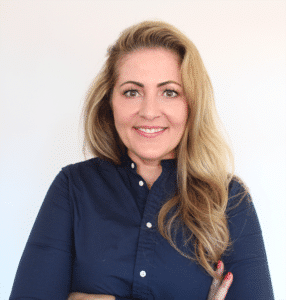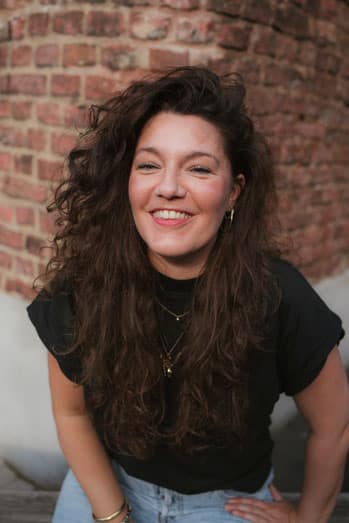An article by Nora Hille and Melanie, Mutmacherin at Mutmachleute e.V.
Discrimination and stigmatization take place every day – and hardly any of us are permanently protected from it. It is often enough not to belong to the majority or perhaps to deviate only slightly from the norm. Thus, without discrimination and the resulting psychological reactions of those affected, such as feeling degraded, anger or self-rejection, a body positivity movement to work through both publicly and individually would probably not even be necessary.
Every person deserves to be respected and treated with dignity. No matter what origin, skin color, religion and sexuality. No matter what identity, gender, political views, etc.. Unfortunately, the reality is often different…
Rike Sauer, author
Forms of discrimination
Women are still discriminated against in our society because they are women. People – including women – are discriminated against because they are childless singles or mentally ill in their late 30s. If someone belongs to several disadvantaged groups, one speaks of multiple discrimination as soon as more than one dimension comes into play in the discrimination. In this case, however, there may also be an additive or reinforcing form of discrimination.[1]
When several dimensions – also called “socially stigmatized identities”[2] – are taken up by the discriminator and interact with each other, so that they can hardly or no longer be separated from each other, we speak of intersectional discrimination. In our example, guest author Melanie, as a single woman in her late 30s, without children and a “smooth” career path, suffering from mental illness, has already been exposed to this intersectional discrimination several times.
World Day of Social Justice
February 20 is World Social Justice Day, established in 2009 by the United Nations (UN) to commemorate “the guiding principle of social justice in communities.” From the UN’s point of view, social justice is one of the most central global tasks in order to “strengthen development processes and human dignity. This includes the rights of indigenous peoples and migrants, as well as the rights of people who are disadvantaged because of age, ethnicity, religion, culture, disability, or gender.”[3]
Social values
People have personal values. Companies, non-profit organizations, political parties, associations, churches, etc. are committed to values. All of this shapes the values of our society, which, despite the many commonalities of majorities, always remain heterogeneous in the end.
FemalExperts magazine is also committed to its values. Among them, for me, the value of diversity and equality – and, by the way, crucial to my becoming the Mental Health columnist for this wonderful, women-empowering online magazine:
We want to offer all women and those who feel they belong to the female gender an inclusive platform – No matter what skin color, what cultural background or what physical and mental constitution you bring with you – For us, the diversity of women is not a shortcoming, but an asset, which we want to give a voice in the context of the business and corporate world.
How socially just is our society, especially the world of work, health and social systems?
What about social justice in Germany, especially in terms of participation and equal opportunities? Does the General Equal Treatment Act (AGG) contribute sufficiently to a working world free of discrimination? The mental risk assessment based on §5 of the Occupational Health and Safety Act also aims to fulfill the company’s duty of care from this aspect. Does all this work or does much remain theory?
And more concretely: Given the high prevalence of mental illness (one in three people will be affected in the course of their lives), shouldn’t our health and social system, as well as education and the world of work, be designed precisely to enable mentally ill people, including women, to participate and provide the necessary support? Because smart and committed women are essential to our society, regardless of whether they are going through a mental health crisis or illness? What about their right to equal opportunity?
Melanie’s experience with intersectional discrimination.
Melanie (39), whose story will be the primary focus of this column, has asked herself these questions so many times. Sometimes angry, sometimes desperate. Until the age of 32, she had given everything to function. Always worked a lot and with commitment despite bullying by colleagues. At some point I hardly slept at all, hardly ate until I collapsed. Only then was he diagnosed with complex post-traumatic stress disorder (kPTBS), also called trauma sequelae disorder, at a clinic. She had been suffering from this for many years, but had always tried to suppress the symptoms and repress the inner suffering. The kPTBS is currently manifesting in Melanie with depression, anxiety, flashbacks and dissociation.
That it was the mental illness that had repeatedly tripped her up since the time after she graduated from high school and made a straight career and life course impossible – now Melanie finally had an explanation.
Contact via Mutmachleute e.V.
Melanie and I met through Mutmachleute e.V., where we are both involved as Mental Health Ambassadors against Stigma. The website mutmachleute.de has been online since January 2018 and addresses the general public as well as affected persons, their relatives and friends with education and anti-stigma work. The message to the public is “Look, these are PEOPLE, not DIAGNOSES!”. People in mental crises, in turn, are to be encouraged by the positive experiences and paths of other sufferers who show their faces on the homepage.[4] With their concept, Mutmachleute e.V. contributes to the destigmatization of mental illness and supports social change so that talking about mental health becomes more and more natural.

Continued Melanie’s report
Melanie has a lot to say about social justice and intersectional discrimination against women with mental illness. “I have complex trauma sequelae disorder, am female, 39 years old, single and childless. Due to my illness, I did not have a straight path in life. Depression, anxiety disorder and suicidal thoughts dominated my thoughts for a long time. Therefore, I could not finish a training as a masseuse in my early 20s without knowing what was really wrong with me.
Due to my inner and outer being lost, my initially quite straight career path, including 13 years in individual trading in the same company, later became more experimental. As an animal health practitioner, I worked in Canada, Ireland and Japan. Enthusiastically learned Spanish, French, Japanese and Chinese in addition to English. Then studied cultural studies, but had to drop out after 6 semesters because of panic attacks. Currently, I’m involved in end-of-life care, anti-stigma work, and children’s and youth ministry.”
Supposed weaknesses become strengths
Melanie continues: “Today, I recognize in these diverse experiences, which at first glance may look to outsiders like an unsteady or even unsuccessful career path, a colorful bouquet of practical experience and individual know-how that distinguishes me and which I would like to confidently offer my future employer.
Health management in the workplace: statement by psychologist Dörthe Dehe
Here is a fitting place for a change of perspective within this column. That’s why I ask Dörthe Dehe, a psychologist and long-time expert in health management, what importance is now attached to mental health in HR departments and by managers. How they believe employers should deal with employees in mental health crisis/challenge or with mental illness (if known).
Dörthe Dehe explains: “The issue of health should be given a very high priority in all management decisions and in the design of working conditions. A critical point is that although many companies have a company health management system, this is still generally too strongly limited to biological components, such as ergonomics or various exercise offerings.
In terms of a modern biopsychosocial understanding of health, mental health, including its socially oriented components, must be given much more consideration now and in the future. I am thinking here, among other things, of stress management and resilience training, the implementation of relaxation times in the workplace (e.g., through meditation), and a completely new culture of breaks that corresponds to the human organism. By this I mean that most people should stop work every 60 to 90 minutes and explicitly relax for a moment. Mini breaks of 3 to 5 minutes would be a good start.

In addition, conflict management is lacking in most workplaces. Conflicts are still seen as abnormal and unproductive, people with conflicts are understood as not being able to work in a team. However, conflicts are completely normal and it is not always possible to resolve a conflict with the usual tools. This then requires help from outside, e.g. through mediation. Such methods should be supported much more in companies, as should the low-threshold offer of coaching and psychosocial counseling as a supplement to standard care. Yes, and then it needs a foundation. In my view, that consists of an appreciative, humanistic leadership culture.”
Melanie’s experiences with societal expectations of women
Back to Melanie. What she had to go through on the way to her new self-confidence (“colorful bouquet of practical experience and individual know-how”) in terms of frightening discriminatory and misogynistic experiences within the system is hard to believe:
“As a single woman in my early 30s, I didn’t fit the image that society has of a full-fledged woman my age. Because according to this, you have to be in a relationship or married, plan to have children or already have children. I got to feel that there is a zero tolerance limit for a woman without the above attributes – unless she is putting in an above average career.
Did outsiders allow themselves to treat me so badly because of my mental illness? Because I so often experienced shocking degradation of myself as a woman – which made me feel degraded even in my womanhood. So many times I was ashamed of myself. There wasn’t much left of my confidence as a result.”
Heteronormative gender roles and societal expectations.

Melanie’s experiences regarding the heteronormative expectations of mid-thirties women in our society can only be confirmed in many ways by Jennifer Klinge, copywriter, brand and social media strategist, and longtime co-editor of the online magazine for singles “Jubel Trubel Zweisamkeit.”
In March 2023, Jennifer Klinge’s first book “Auch gut!” will be published by Palomaa Publishing. It includes stories about being a woman and about her personal dealings with the societal expectations with which she is repeatedly confronted as a childless, self-employed single woman in her mid-30s.
Statement from author Jennifer Klinge
Jennifer’s mission: “Women, break the narrow time frames full of societal expectations and do what you want, when you want!” That’s because she’s experienced firsthand how enormously damaging the influence of society’s expectations of women in her age group can be on their own mental health: “It seems like there’s a universal master plan for living well for women 30 and older. The heteronormative stories of mandated wedding happy endings, sad singles, career pressures, ticking clocks, and stale trains are everywhere. And they can attack mental health. That is, when one’s own life goes far from the model and we anchor the narratives about supposed failures in ourselves as truths after a certain age.
So for a while I lost touch with myself because I saw myself through the filter of societal expectations and problematized myself from that perspective. Sometimes, however, you may have to lose yourself first, really splinter, in order to enter into a dialogue with your own desires.
What helped me: To get moving, especially in my own head – more knowledge about patriarchally constructed womanhood and role models who show: Many things in life can simply also be good. I think it’s important to break down the narratives around being a woman and growing up to live a vibrant life with your own dreams and timing. The visibility of different life concepts – whether freely chosen or not – gives courage and perspective.”
Melanie’s path: A permanent struggle
With the keyword “different life concepts, partly freely chosen, partly not freely chosen” we come back to Melanie, because a mental illness is never freely chosen: What she absolutely did not expect was how difficult the road after the clinic would be for her. Looking back, she found it very distressing how little support there is, especially for women with mental illness, in our health and social services system.
“Because I wanted to return to work soon, I visited women’s counseling centers. They fobbed me off with the explanation ‘You need trauma therapy, we can’t help you’. I had difficulties with the health insurance company, which did not want to cover the necessary therapy costs, although it was obliged to do so. I had to fight constantly and research all the information myself. But the most frightening thing I found was when medical professionals treated me and my traumatized parts unprofessionally and unsympathetically.”
Finally retraining, but discrimination was everyday life
“After a long struggle, I was approved for retraining as a physical therapist. Very quickly, however, I realized that I had apparently landed in the 70s. Suddenly, as a woman, I had nothing at all to say and was treated like fair game. And this despite the fact that I was in a retraining program with supposedly professional staff!
Some of the instructors behaved in a very derogatory manner towards us participating women. I look very feminine and accordingly was either belittled, not taken seriously or used for flirting. When I complained, I was told that she was mentally ill. Suddenly I was even incapacitated and even higher contact persons only smiled at me when I complained!
I began to wonder:
- Can they do whatever they want to me because I am a woman and mentally ill?
- How can it be that I, as a woman, am seen only as a man’s object?
- Why do no women-friendly structures exist in retraining measures, employment offices, etc.?
- Why is it that women, who for whatever reason have a difficult relationship with themselves, have stereotypical patriarchal images projected onto them, so that even greater degradation occurs?”
Melanie’s demands for a more socially just society and positive connotation of the feminine – free from discrimination
“Femininity and the female force is something very positive. She is sensitive and strong, considerate of others and does not always have to ‘do’, but can also just let things happen and grow.
- We need structures that dignify the feminine – instead of demeaning it.
- More education and protection is needed for women in the mental health system.
- As a woman, I don’t have to or want to be or act like a man.
- Women are allowed to defend themselves, and they must be taken seriously in doing so.
- Outdated images of women need to be challenged. I can also drive a nail into the wall with high heels on my feet – without being considered a sex symbol because of it.
- And I’m also ‘not an old rag’ or worth less in any way just because I’m still single in my late 30s – a man would NEVER hear such a pejorative.
- I want a society that is so informed, open, tolerant and equal that it doesn’t need to stigmatize women, single women, single women in their mid-30s without child(ren), mentally ill people (m/f/d) or any other group.”
A poem as a conclusion
Du bist o.k. – ich bin o.k. Du bist o.k., ich bin o.k.. Ich bin ich, Du bist Du. Warum ist es manchmal so schwer, den anderen sein zu lassen wie er ist? Ohne Bewertung? Warum verstehen manche Leute nicht, dass schon ein Blick abwerten und verletzen kann? Wenn Du Dich liebst, wirst Du mich annehmen können wie ich bin. Du bist o.k. und ich bin es auch. Und wer dich nicht o.k. findet oder mich, der darf uns getrost gestohlen bleiben.
[1] For forms of discrimination at a glance, see: https://www.mehrfachdiskriminierung.ch/definition/ (accessed February 20, 2023).
[2] Rüsch, Nicolas: The Stigma of Mental Illness: Strategies against Exclusion and Discrimination. Munich, 2021, p. 136.[3] “World Day of Social Justice” article. Published at: https://www.bildungsserver.de/nachricht.html?nachricht_id=593 (accessed February 20, 2023).
[4] https://mutmachleute.de/mutmachleute-eine-kleine-geschichte/
About the author
Nora Hille was born in 1975, is happily married and has two children. She studied history, literature and media studies, worked in communications/public relations for 12 years and has now retired for health reasons. Today she writes articles on the topics of mental health and mental illness as a sufferer and experience expert. She also writes literary essays, poems (preferably haikus) and short prose. She regularly publishes her mental health column here at FemalExperts Magazine and is Editor of eXperimenta - the magazine for literature, art and society. Anti-stigma work is close to her heart: she is an encourager at Mutmachleute e.V. and is committed to Anti-Stigma-Texts against the stigmatization (exclusion) of the mentally ill in our society for more togetherness, tolerance and equality. In autumn 2023 her book "When Light Defeats Darkness" will be published by Palomaa Publishing. A book of encouragement about how to live a good and rich life despite bipolar illness - and the enormous challenge that this means every day for the inner balance of those affected.
- 20. November 2022










